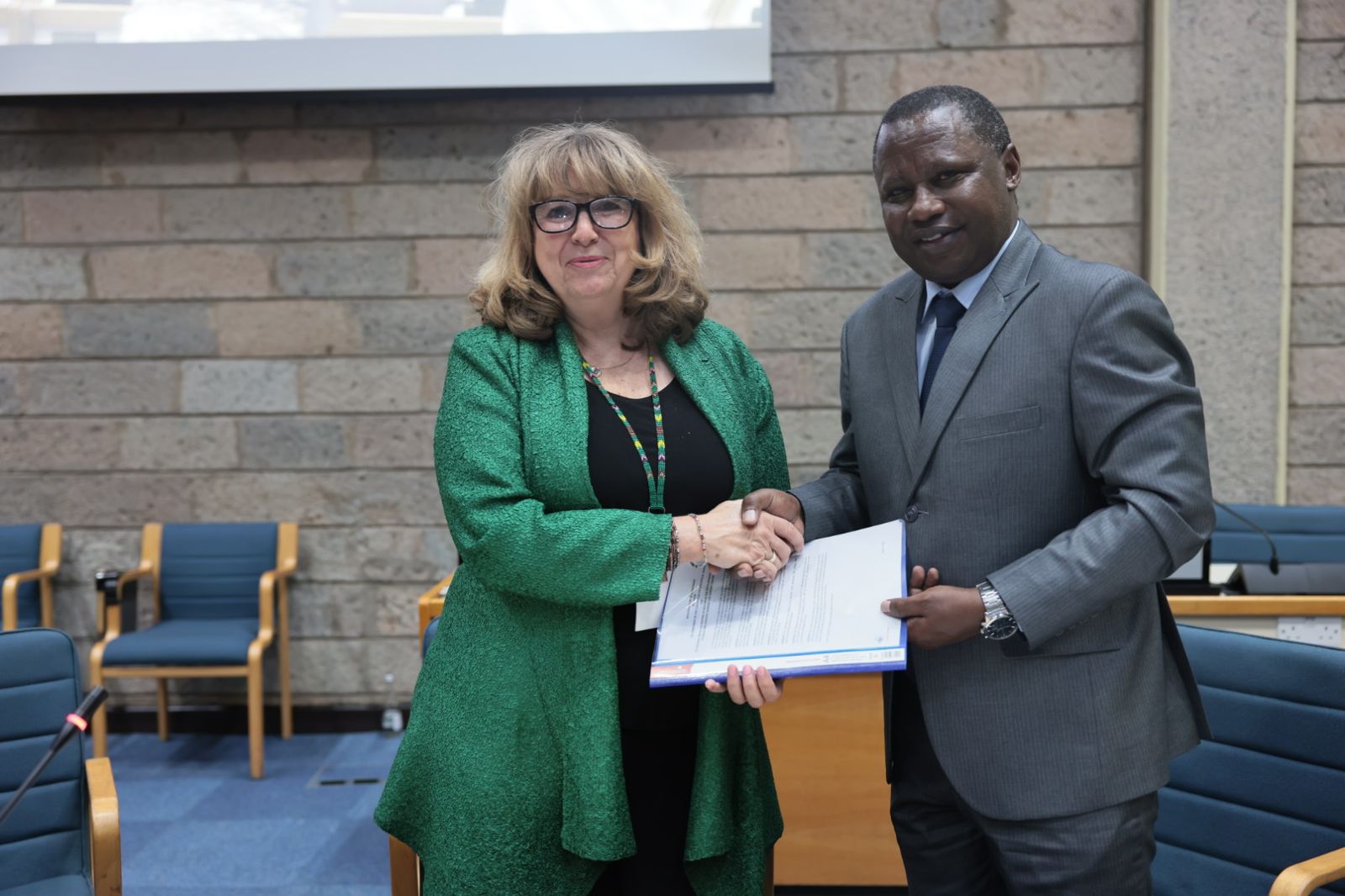RCMRD Showcases at the IUCN World Conservation Congress 2025 in Abu Dhabi
By Abigael Sum| Oct, 2025
The Regional Centre for Mapping of Resources for Development (RCMRD) proudly participated in the IUCN World Conservation Congress 2025, held in Abu Dhabi, United Arab Emirates (UAE). The IUCN World Conservation Congress is one of the world’s most influential platforms shaping the global conservation and sustainable development agenda.
With only five years remaining to meet the targets of the Paris Agreement, the Sustainable Development Goals, and the Global Biodiversity Framework, this year’s Congress called for bold, collective action to accelerate progress for both nature and people.
Representing its role as one of Africa’s Technical and Scientific Cooperation Support Centres (TSCs) under the Convention on Biological Diversity, RCMRD showcased its expertise and impact in biodiversity data, ecosystem management, and capacity building across Eastern and Southern Africa. At the IUCN Africa Pavilion, RCMRD presented its mandate, key activities, and partnerships supporting 11 countries, highlighting the integration of spatial data in ecosystem monitoring and policy development.
RCMRD co-hosted an exhibition booth alongside CIFOR-ICRAF, the Centre de Suivi Ecologique (CSE), and the Observatoire des Forêts d’Afrique Centrale (OFAC) to showcase activities under the Africa Regional Centres of Excellence (ArcX) Programme. The programme aims to serve as a leading reference point for up-to-date information that informs policy decisions on forestry and biodiversity, while advancing both regional and global conservation agendas.
The booth drew significant interest from conservation leaders, researchers, and policymakers keen to learn more about RCMRD’s innovative tools, particularly the RCoE-ESA Map Book and Geoportal, which provide valuable spatial insights to support evidence-based decision-making in ecosystem management.
During the Congress, RCMRD also engaged in bilateral meetings with UNEP-WCMC and Madagascar’s Ministry of Environment to discuss updates to the World Database on Protected Areas, reinforcing its pivotal role in supporting accurate, up-to-date conservation data.
The event, held once every four years, featured dynamic sessions on topics such as Geospatial AI, ecosystem typologies, protected area governance, and storytelling for conservation, underscoring the importance of bridging science and emotion in environmental communication.
RCMRD also took part in the unveiling of the Atlas of African Protected Areas, a flagship publication developed by the European Commission’s Joint Research Centre (JRC) in collaboration with RCMRD and other partners. The Atlas provides invaluable geospatial insights and analyses to guide policymakers and conservation practitioners across Africa.
Among the key announcements at the congress, Panama was confirmed as host of the next IUCN World Protected and Conserved Areas Congress (2027), while IUCN introduced the RHINO framework to accelerate nature-positive outcomes globally.
RCMRD’s participation reaffirmed its commitment to advancing data-driven conservation and strengthening partnerships that empower African countries to achieve their biodiversity goals through science, innovation, and collaboration.
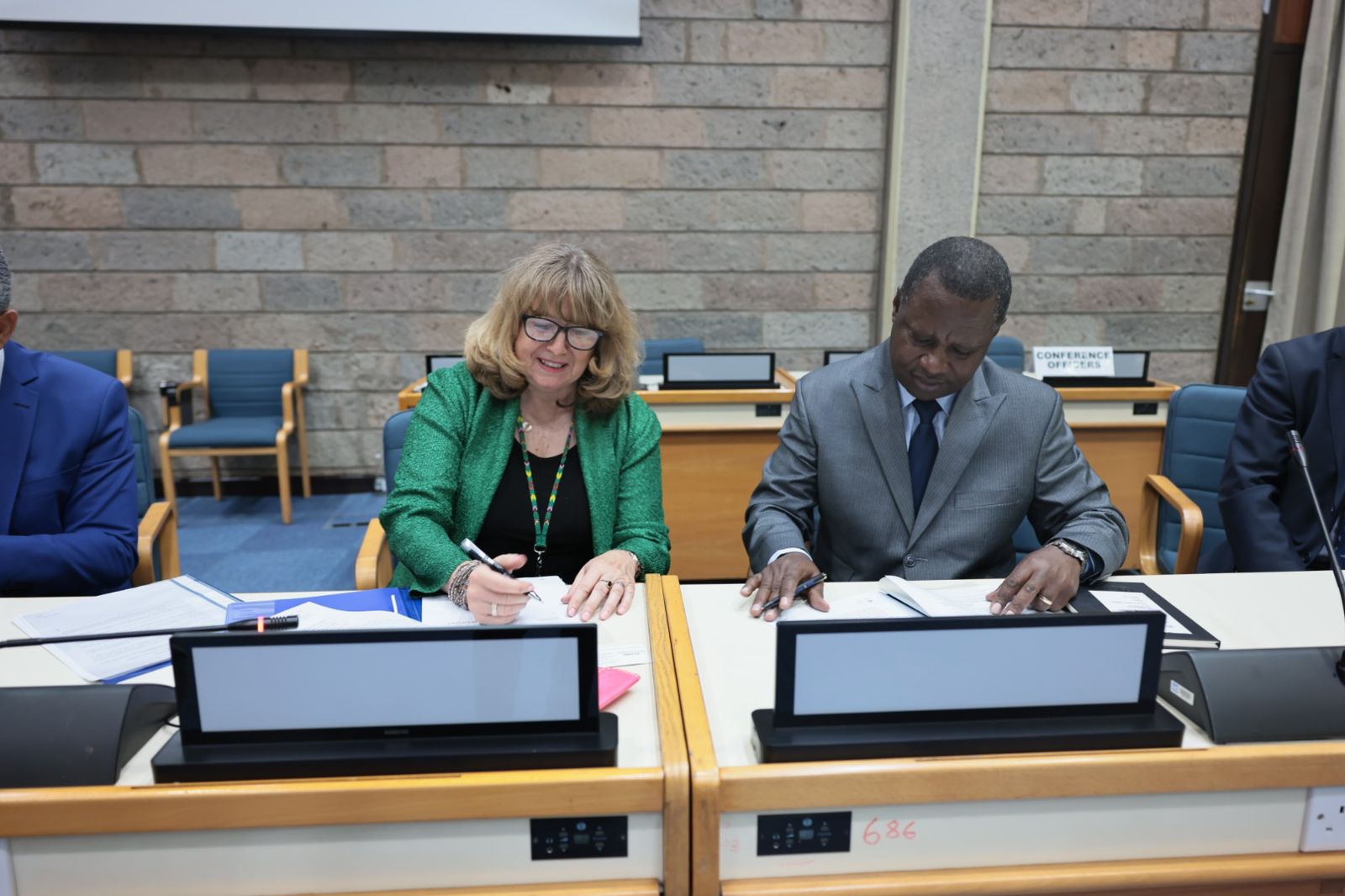
The Regional Centre for Mapping of Resources for Development (RCMRD) has been officially designated as a Technical and Scientific Cooperation Support Centre (TSC) under the Convention on Biological Diversity (CBD).
This milestone was marked by the signing of a host agreement between RCMRD and the CBD Secretariat during the 20th session of the African Ministerial Conference on the Environment (AMCEN), held on July 18, 2025.
This designation places RCMRD at the heart of regional efforts to implement the Kunming-Montreal Global Biodiversity Framework (GBF), specifically supporting Eastern and Southern African countries in their biodiversity conservation goals.
The designation of RCMRD as a TSC signifies international recognition of the Centre’s role in:
- Biodiversity data production for evidence-based decision-making
- Capacity building for institutions, researchers, and practitioners
- Policy integration of GBF targets into national and local frameworks
- Science-based solutions to inform conservation, climate adaptation, and sustainable development
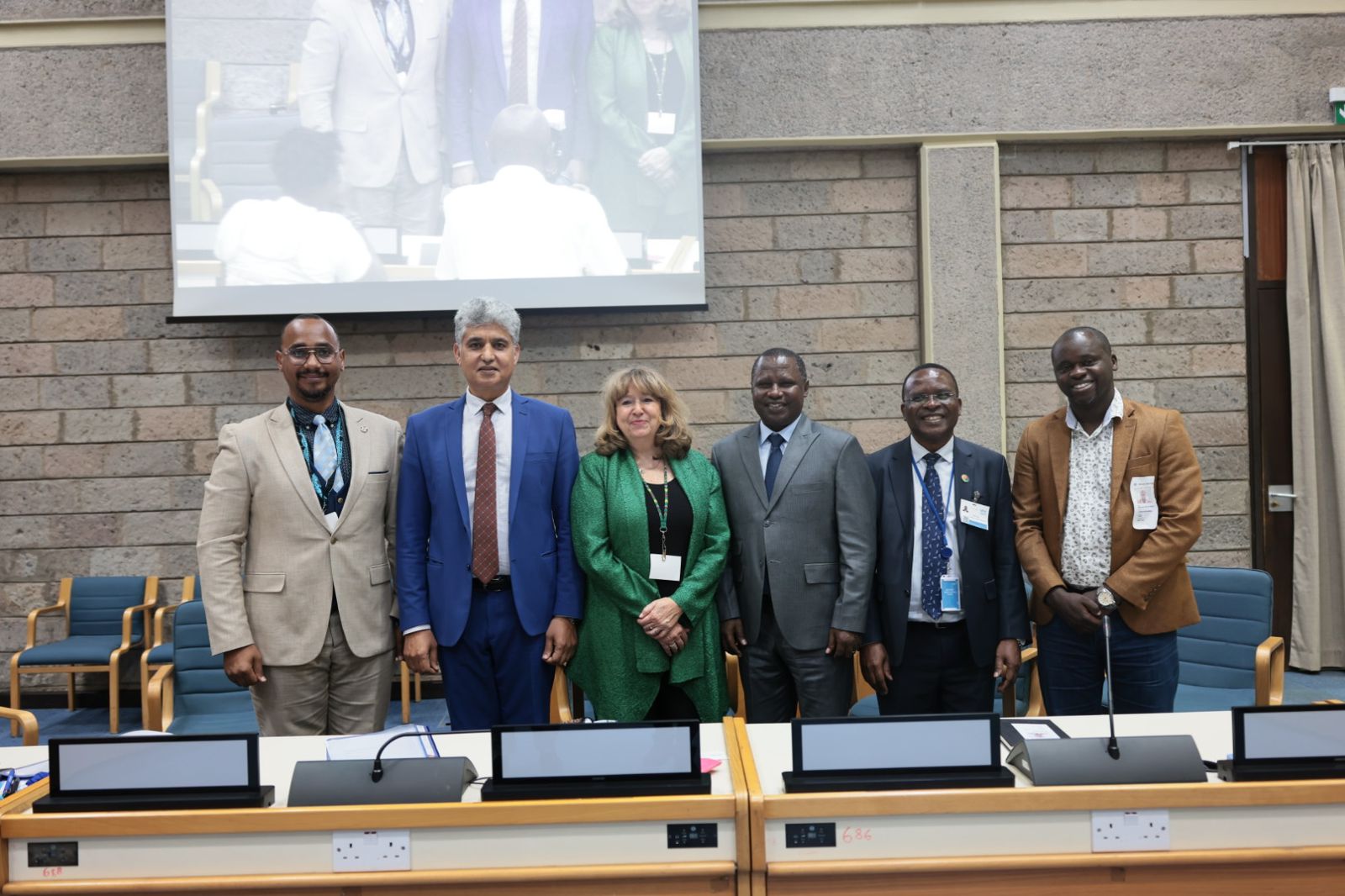
RCMRD joins a network of 18 TSCs globally, including five in Africa: OSS, COMIFAC, CSE, SANSI, and now RCMRD. This network demonstrates growing momentum for South-South cooperation, fostering regional innovation and partnerships grounded in shared challenges and opportunities.
This means that as a newly designated TSC, RCMRD will serve as a regional hub for technical and scientific support in biodiversity and ecosystem management. This means:
- Scaling up its work in Earth Observation and GIS to support 30x30 conservation targets
- Providing governments and stakeholders with open-access data, analysis tools, and platforms
- Leading capacity development programmes tailored to national biodiversity priorities
- Enhancing collaboration with partners such as UNEP, IUCN, UNCBD, and regional economic communities (RECs)
RCMRD will also play a proactive role in facilitating knowledge exchange across African countries, contributing to the co-development of tools, regional assessments, and community engagement models aligned with the KMGBF. The countries that are covered by our sub regional TSC support centres in Africa. They include: Comoros, Eswatini, Ethiopia, Kenya, Madagascar, Rwanda, Somalia, South Sudan, Tanzania, Uganda, and Zambia.
“This designation reaffirms our commitment to supporting African countries with the technical capacity they need to meet global biodiversity targets. We are honoured to join this network of Centres working to safeguard nature through data, science, and collaboration,” said Dr. Emmanuel Nkurunziza, Director General, RCMRD.
RCMRD’s designation comes at a time of renewed urgency and opportunity for biodiversity action. As nations align their policies and strategies with the KMGBF, institutions like RCMRD will be instrumental in translating global ambitions into regional and national progress.

The Regional Centre for Mapping of Resources for Development (RCMRD) has renewed its Memorandum of Understanding (MoU) with the International Union for Conservation of Nature (IUCN), reinforcing a long-standing partnership committed to advancing sustainable natural resource management in the region.
The MoU was officially signed at the IUCN offices in Nairobi. It brings together IUCN’s globally recognized expertise in conservation with RCMRD’s geospatial and technical capabilities. This collaboration aims to strengthen data-driven decision-making, promote regional cooperation, and support policy development aligned with the Kunming-Montreal Global Biodiversity Framework (GBF).
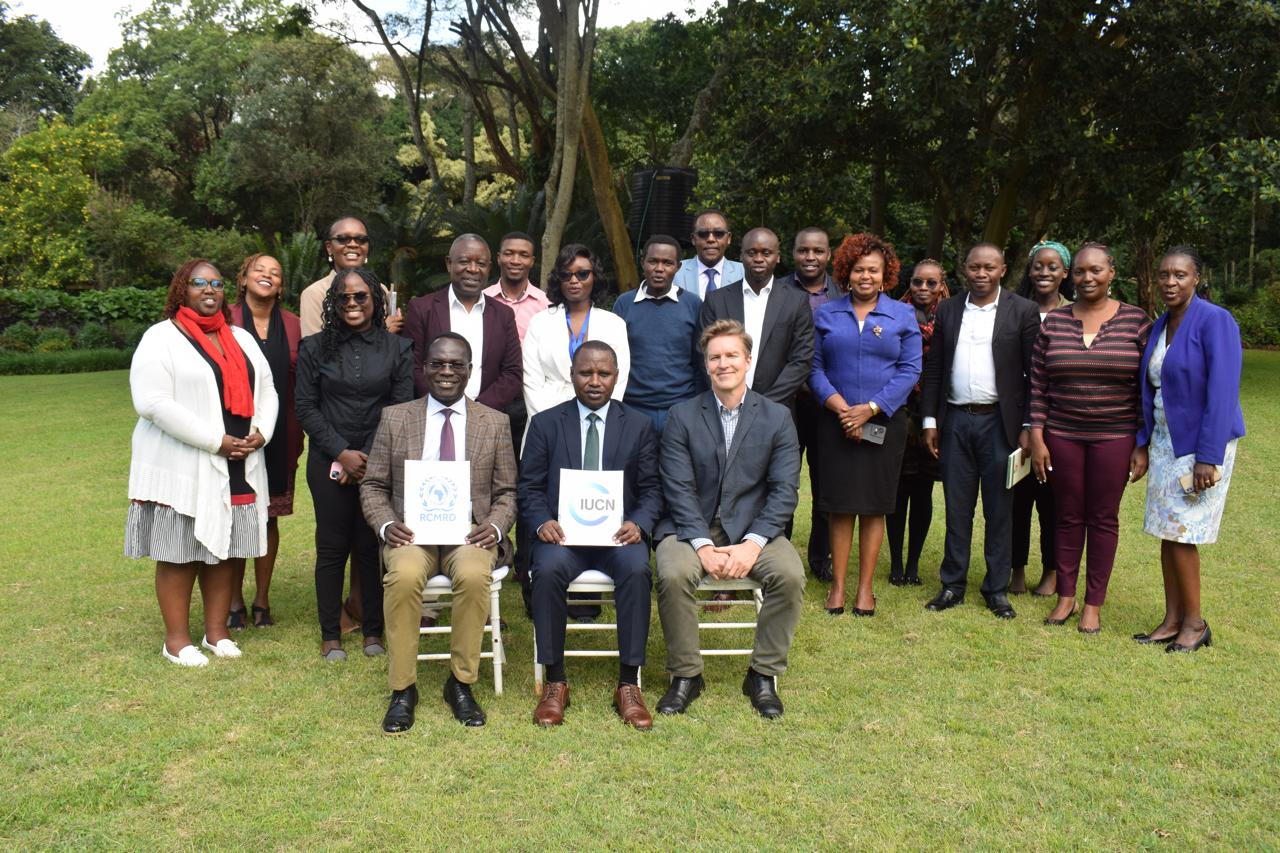
RCMRD’s recent designation as a Technical and Scientific Support Centre under the Convention on Biological Diversity (CBD) further underscores the importance of this partnership. Through joint efforts, RCMRD and IUCN will:
· Provide technical support to Member States in Eastern and Southern Africa;
· Enhance national capacities to integrate biodiversity data into policy and planning;
· Promote regional knowledge sharing and collaboration; and
· Support evidence-based, inclusive approaches to environmental governance.
Speaking during the signing, leaders from both institutions reaffirmed their commitment to advancing biodiversity conservation and sustainable development in the region. The renewed MoU represents a significant step toward ensuring that governments and stakeholders have access to reliable data, innovative tools, and collaborative platforms necessary to achieve biodiversity targets.
Together, RCMRD and IUCN are building a stronger foundation for sustainable natural resource management and inclusive governance, ensuring that regional priorities are aligned with global biodiversity goals.
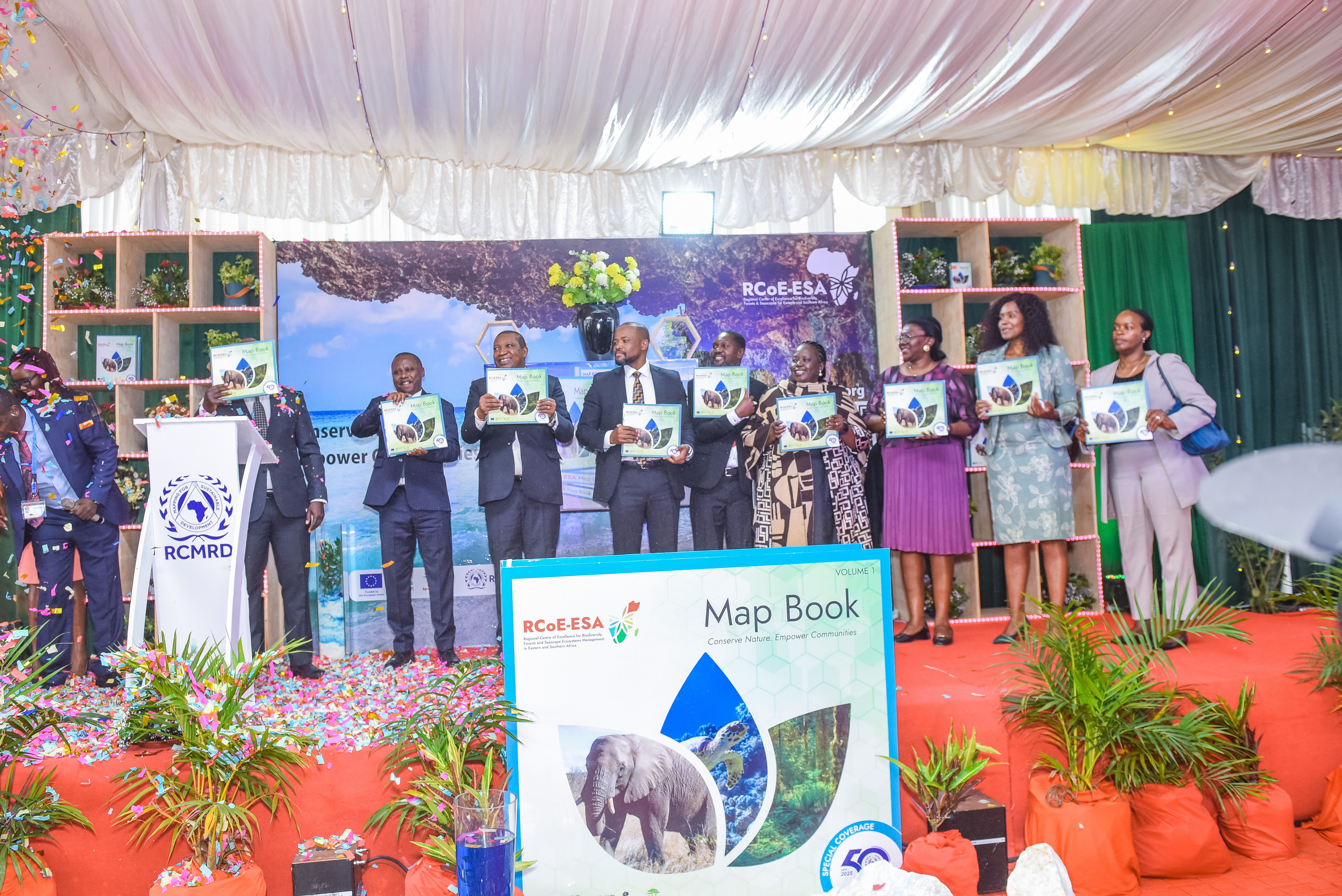
The Regional Centre of Excellence for Biodiversity, Forests and Seascapes in Eastern and Southern Africa (RCoE-ESA), hosted at RCMRD, has officially launched its inaugural Map Book, a landmark publication that consolidates maps, data, and visual narratives to illustrate the state of biodiversity, ecosystems, and conservation efforts across the region.
This first-of-its-kind publication supports the implementation of the Kunming-Montreal Global Biodiversity Framework, particularly advancing Target 1 (spatial planning) and Target 3 (effective area-based conservation). It also strengthens regional collaboration and knowledge sharing among the 24 countries served by the Centre.
The launch event, held at the RCMRD Headquarters in Nairobi, Kenya, brought together dignitaries, partners, and stakeholders, underscoring the political will and institutional commitment to advancing data-driven conservation.
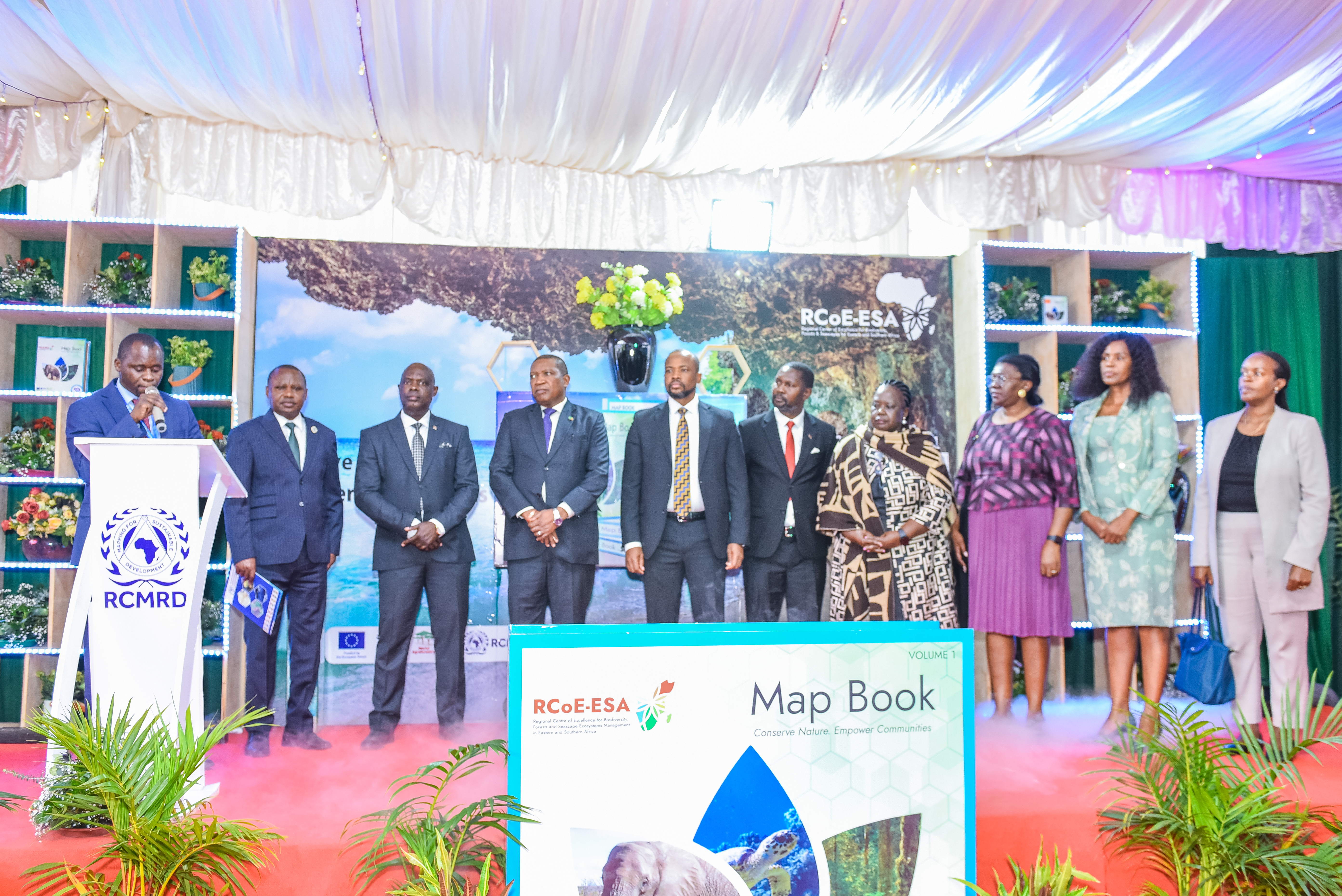
Leaders, Malawi’s Minister of Lands Hon. Deus Gumba and Kenya’s PS for Lands Nixon Korir, and Mr. Julius Muia, Chair, RCMRD Governing Council, join RCMRD Director General Dr. Emmanuel Nkurunziza in launching the RCoE-ESA Map Book at the RCMRD@50 celebrations.
In their remarks, the dignitaries commended the RCoE_ESA’s leadership in leveraging spatial data for biodiversity management and equipping countries with tools to meet both national and global conservation targets.
The Map Book features over 30 thematic maps, covering topics such as land cover change, protected areas, marine ecosystems, forest degradation, and restoration initiatives. Each map is complemented with data insights and brief interpretations, making the publication a valuable resource for diverse audiences, from policymakers and practitioners to researchers and students.
Available in both print and digital formats, the Map Book reflects the Centre’s mission of bridging the gap between science and decision-making, while empowering countries to monitor, report, and act on biodiversity priorities.









